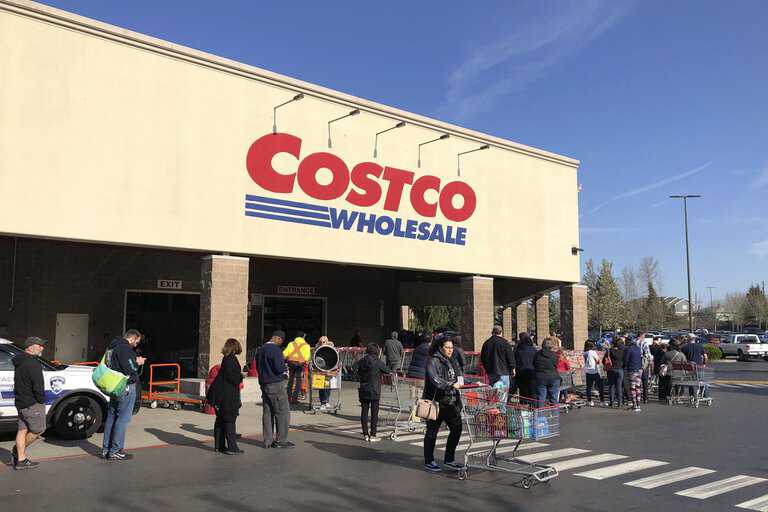Costco, Full Foods rise in Greenpeace rankings of grocery chains’ plastic use

Image: Collected
Costco’s strides to reduce product packaging landed the Issaquah-based wholesale club at No. 6 on Greenpeace’s best-to-worst rating of 20 large grocery chains’ improvement in getting rid of single-use plastics, three slots greater than in Greenpeace’s 2019 audit.
Environmentally friendly group lauded Costco for transitioning food court packaging to compostable alternatives and pledging to lessen its utilization of Styrofoam - but said Costco, and almost every other chain it analyzed, should still be performing much more to reduce its plastic footprint. Costco declined to react to questions about Greenpeace’s report.
All of the supermarkets Greenpeace ranked “continue steadily to neglect to address the pollution crisis,” said Greenpeace communications professional Perry Wheeler.
Notably, Greenpeace’s ranking will not rely on info on the chains’ actual plastic footprint, which many grocers don’t divulge.
“Retailers’ transparency around those numbers absolutely is a continued barrier for the general public,” Wheeler said. Moreover, position retailers on the quantity of plastic they actually use would likely “end up merely being a ranking by size,” he added. “We are rank them on their method of choosing responsibility for the plastics to get, independent of their size.”
Entire Foods, which Seattle-based Amazon acquired in 2017, came in in No. 10, one slot higher than in 2019. The grocer, the first in the country to ban single-use plastic checkout bags and plastic straws, does not currently have any public policies or commitments to lessen its plastic footprint, Greenpeace located. Whole Foods did not respond to questions.
Grocers with the very best plastics use policies, ranked by Greenpeace
1. Giant Eagle
2. Aldi
3. Sprouts Farmers Market
4. Kroger
5. Albertsons
6. Costco
7. Walmart
8. Ahold Delhaize
9. Wegmans
10. Whole Foods Market
Pittsburgh-based Giant Eagle was crowned the best performer about plastics use for its commitment to eradicate all single-use plastics by 2025. Aldi, Sprouts Farmers Market, Kroger - which owns Fred Meyer and QFC - and Albertsons were the next-best chains.
Bringing up the trunk was Texas-based HEB, which is regularly ranked among the best grocery stores to be an employee.
Greenpeace scored the chains on their plastics policies, the degree to which they’ve reduced plastics use, new plastics-related initiatives and transparency, based on grocers’ responses to a 21-question survey, email and phone conversations, and public information.
Overall, Greenpeace issued a pessimistic report card of grocery chains’ efforts to get rid of single-use plastics, which happen to be difficult to recycle and clog ocean ecosystems.
“U.S. retailers will be going at a snail’s pace on plastic reduction efforts,” stated Greenpeace USA Oceans Campaign Director John Hocevar in a statement. “There isn't a single place that folks are confronted with even more single-use plastic than inside our grocery stores, yet these businesses continue to drag their feet and provide excuses.”
Greenpeace recently sued its seventh-ranked grocery chain, Walmart, for positioning what environmentally friendly group contends are actually misleading and deceptive recyclability labels on plastic items and packaging. Walmart may be the simply retailer Greenpeace ranked that publicly shares a few of its plastic footprint.
While Whole Foods was an early on leader in grocery sustainability, banning single-use plastic checkout bags in 2008, it has recently been considerably more muted on environmentally friendly front. The company announced a plastic straw ban shortly before the release of Greenpeace’s initial plastics report in June 2019, but since then “possesses been largely quiet on its website and doesn’t disclose information on its overall plastic footprint,” Greenpeace wrote. “When Walmart is extra transparent than Whole Food on plastics, which should give customers pause.”
Costco also took action on plastics before Greenpeace’s initial plastics rating, launching a strategy looking to reduce packaging across its stores found in May 2019.
The retailer’s goals, though commendable, lack specificity, Greenpeace contends.
Costco “lacks a thorough and bold time-bound policy that prioritizes the elimination of single-use plastics and scaling up of reuse, refill and package-free alternatives,” Greenpeace wrote in its report.
Even though Costco makes a great deal of information regarding its plastics policies public, Greenpeace dinged Costco for not posting data on its total plastic footprint across its 558 U.S. locations. (Costco features reported on gross annual reductions to its plastic footprint.)
Costco was the prospective of another aggressive Greenpeace campaign this year 2010. Titled “Oh No Costco!” the effort highlighted the wholesale club’s sale of destructively farmed seafood species, ultimately prompting Costco to eliminate the sales of such fish at its stores.
Source: https://www.seattletimes.com